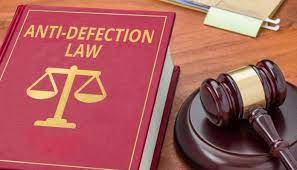Article 63-A of the constitution and disqualification of member national assembly on defection
Speaker of National Assembly has no power to disqualify or stop defection of any member of national assembly under the article 63-A of the constitution
PTI is
facing the serious possibility of defections on the issue of vote of
no-confidence against Prime Minister. PTI has come up with the strategy to keep
its members away from the proceedings of national assembly on the day of voting
on no-confidence motion. The PTI leaders are openly threatening the ruling
party MNAs with disqualification in case anyone violates the party whip.
The PTI
ministers are giving the impression that National Assembly Speaker Asad Qaiser
has the power to disqualify members over floor-crossing under Article63-A of
the constitution. But speaker national assembly has no power to disqualify any
member of the national assembly on the grounds of defection. Under the Article
63-A of the Constitution, titled “disqualification on grounds of defection” shows
that the speaker acts only as a post office in the whole process and the
Election Commission of Pakistan (ECP) holds the final authority to make a
decision on the matter.
Moreover,
the process of de-seating a member takes at least a month as the ECP has 30
days to decide the matter after receiving a reference from the speaker. And
then, the member will have 30 days to file an appeal before the Supreme Court,
which will be required to decide it in 90 days.
Besides
this, before sending a reference to the speaker, the party head is also
required to issue a show cause notice to the member to provide him an
opportunity to explain his position.
Supreme
Court judgment in Ayesha Gulalai disqualification case made it clear that party
leader cannot proceed against a member parliament without giving her/him
opportunity to defend.
The SC
judgement reads that "the Election Commission found and we agree that the
respondent was condemned unheard which is clearly violative of proviso to
Article 63A of the Constitution which obligates the party head to provide any
member against whom a declaration is sought to be given an opportunity to show
cause why such declaration may not be issued against him.
It is clear
and obvious from the record that the respondent was not heard and the stance
taken by her in her response to the show cause was not considered which
violated her legal and constitutional rights."
Experts also believe that the PTI’s decision
to stop its members from attending the session or casting their votes is
against parliamentary and democratic norms, as voting is a fundamental right of
all members, especially if they do it knowing that they can face
disqualification.
Sources said
both the PPP and the PML-N had decided to accept those individuals, who had
quit the parties just before the 2018 general elections, back into the fold.
There are reports that the two parties have already made commitments with some
PTI members that they will get tickets in the next elections as a reward for
their “sacrifice.”
Article 63-A
had clearly defined the modus operandi against dissidents within any political
party. He said no political party could bar entry of its lawmakers to the
parliament.
Supreme
Court Bar Association (SCBA) President Muhammad Ahsan Bhoon in a statement said
that Article 95(2) of the Constitution clearly provided that the National
Assembly speaker was constitutionally bound to summon the house after the
expiry of three days and not later than seven days, after the receipt of any
such requisition.
He warned
that “any undue postponement in calling of the meeting of National Assembly or
any deviation from the Constitution could provide the opportunity to
non-political forces or non-state actors to initiate non-political campaign,
the responsibility of which shall be upon the ruling political elite of the
country.”
Article 63-A, disqualification on grounds of defection
The member
“may be declared in writing by the party head to have defected from the
political party, and the party head may forward a copy of the declaration to
the presiding officer and the chief election commissioner (CEC) and shall
similarly forward a copy thereof to the member concerned: provided that before
making the declaration, the party head shall provide such member with an
opportunity to show cause as to why such declaration may not be made against
him.”
“Upon
receipt of the declaration under clause (1), the presiding officer of the House
shall within two days refer, and in case he fails to do so it shall be deemed
that he has referred, the declaration to the CEC who shall lay the declaration
before the ECP for its decision thereon confirming the declaration or otherwise
within thirty days of its receipt by the CEC.
Article
63(4) states “where the ECP confirms the declaration, the member referred to in
clause (1) shall cease to be a member of the House and his seat shall become
vacant.
However,
according to the next provision, “any party aggrieved by the decision of the
ECP may, within thirty days, prefer an appeal to the Supreme Court which shall
decide the matter within ninety days from the date of the filing of the appeal.
Khalid Bhatti














Post a Comment